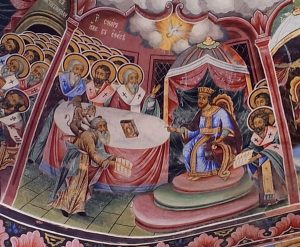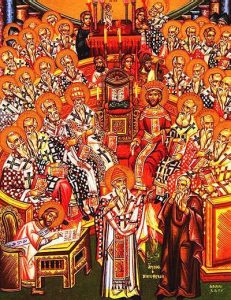In Christianity, Scripture has served as a guiding principle for morality and truth. Councils help utilize Scripture and Christian morality and theology to current problems. Since the 2000 history of the Church, numerous Ecumenical Councils have been called. Most major Christian denominations accept the first four councils and the Orthodox and Catholic Churches mutually accept the first seven. Obviously since the mutual schism between East and West, both have had their own councils, especially the Catholic Church.
Councils are considered authoritative guides in Orthodoxy and Catholicism. It is believed that through the ecumenical presence of the entire Mystical Body, represented by the hierarchy, that the Holy Spirit infuses truth into the proceedings. Many Protestant denominations do not hold to this belief.
In Catholicism in particular, the Council is considered an important living form of truth found via the Holy Spirit. The Council must adhere to the deposit of faith and Scripture when dealing with new heresies and moral dilemmas. The Council must also be convened and in union with the Roman Pontiff.

In Orthodoxy, this is not the case. Unity with Rome has no bearing on the legitimacy of the council.
The most recent councils in Orthodoxy was in 2018 and for the Catholic Church in the early 1960s at Vatican II.
In essence, but not officially listed, the first council of the Church was the Council of Jerusalem, when the Apostles and disciples met regarding the issue of circumcision for Gentile Christians. St Paul and St Peter debated the rule of the law over non Jewish Christians but the assembly decided that this law would not be imposed upon Gentiles.
After the Roman persecutions, Christianity was able to emerge as the Empire’s official religion in the 4th Century. The First Council of Nicaea in 325 AD dealt with the issue of Arius who taught the Son was a special creation of the Father. This heresy was condemned in the Nicene Creed. The First Council of Constantinople in 381 AD re-confirmed the condemnation of Arius.
The Council of Ephesus in 431 AD answered the question of Nestorius who declared Mary was only the mother of Christ but not the mother of God. The Church declared since Jesus is not two independent parts but one person, that Mary was indeed the Theotokos or Mother of God.

Again in 455, The Council of Chalcedon condemned the heresy of Eutyches and Monophysite heresy that instead of dividing the two natures of Christ as Nestorius did, instead lumped Christ’s two natures into one incomplete nature that lacked many human qualities.
Later in 553 AD, the Second Council of Constantinople again confirmed the teachings of the previous councils regarding these heresies. However, a compromise heresy in 681 AD emerged which taught that Christ had two natures but no human soul. This heresy of Monotheletism was condemened at the Third Council of Constantinople.
Other councils, such as Nicaea II and later councils of Constantinople would also condemn the Iconoclast heresies which denounced the veneration of sacred images.
After the schism, various Councils from Lateran to Trent to the Vatican Councils would occur which would deal primarily with Catholic issues, while in the East, the Orthodox Churches would deal with their own internal matters.
Yet despite the unfortunate splintering of the Christian Churches since the first seven councils, the Church has received a strong foundation from the councils in guidance to who Christ is and the defense of the faith from early Christian heresies which would have distorted the true nature of Christ found in the Gospels and handed down from the apostles. These early councils continue to define orthodox Christianity today.
Please also review AIHCP’s Christian Counseling Certification and see if it meets your academic and professional goals. The program is online and independent study and open to qualified professionals seeking a four year certification in Christian Counseling.
